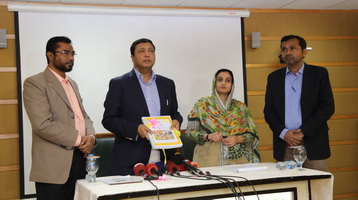
Adoption of Biotech Crops Crucial in Pakistan
January 9, 2019| |

The press conference, which was organized by PABIC, aimed to raise awareness of the tremendous potential of biotechnology commercialization for the sustainable development of Pakistan's economy. "This is really a good sign that Pakistan increased its irrigated cotton area by 3.4 percent or 100,000 hectares from 2.9 million hectares to 3 million hectares during 2017," said Prof. Choudhary. He added that for the last eight years, an estimated 725,000 smallholder Pakistani farmers have been benefiting from the economic gains in using biotech cotton. It is estimated that the economic gains from biotech crops for Pakistan for the period 2010 to 2016 was US$4.8 billion and US$483 million for 2016 alone, according to ISAAA Brief 53.
For more details about biotech crops in Pakistan, visit the PABIC website.
| |
Biotech Updates is a weekly newsletter of ISAAA, a not-for-profit organization. It is distributed for free to over 22,000 subscribers worldwide to inform them about the key developments in biosciences, especially in biotechnology. Your support will help us in our mission to feed the world with knowledge. You can help by donating as little as $10.
-
See more articles:
-
News from Around the World
- 2020 Proclaimed International Year of Plant Health by UN General Assembly
- Forecast: Global Agri-biotech Market Size to Grow Significantly in the Next 4 Years
- Scientists Engineer Shortcut for Photosynthetic Glitch, Boosting Crop Growth by 40%
- USDA: No GMOs Detected, No Labeling
- Adoption of Biotech Crops Crucial in Pakistan
- SEARCA BIC Releases Policy Briefs on GM Crops
- Chinese Agri Ministry Approves Import of 5 GM Crops
- ISAAA Announces New SEAsiaCenter Director
- Structure and Function of Photosynthesis Protein Explained in Detail
-
Research Highlights
- GM Potato Shows Improved Colorado Potato Beetle Resistance
- Bt Maize Expressing a Fusion Gene Cry1Ab/Cry1Ac Does Not Harm Pollen Feeders
-
Beyond Crop Biotech
- Researchers Develop GM Houseplants to Clean Air
-
Resources
- Trending News on Crop Biotech in 2018
-
Plant
- CRISPR-Cas9 Used to Modify Seed Morphology Traits in Wheat
- Scientists Characterize CRISPR Mutants Targeting Genes Modulating Pectin Degradation in Ripening Tomato
-
Read the latest: - Biotech Updates (January 28, 2026)
- Gene Editing Supplement (January 28, 2026)
- Gene Drive Supplement (February 22, 2023)
-
Subscribe to BU: - Share
- Tweet
